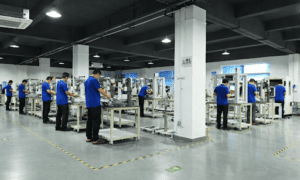China and the United States will meet in Geneva on Tuesday to talk about advanced artificial intelligence.
TakeAway Points:
- On Tuesday, China and the U.S. will meet in Geneva to discuss cutting edge artificial intelligence.
- According to the report, the State Department has exerted pressure on China and Russia to reaffirm US assertions that human decision-makers alone will never use artificial intelligence to decide whether to deploy nuclear weapons.
China and the U.S. to Discuss on AI
U.S. officials emphasised that no discussions would take place regarding Washington’s policies, even as they explored ways to reduce the risks associated with the developing technology.
In an effort to improve communication between the two competitors, President Joe Biden’s administration has made an effort to engage China in a number of areas. AI was brought up in April in Beijing during a meeting between China’s Foreign Minister Wang Yi and U.S. Secretary of State Antony Blinken. They decided to have their first official bilateral discussion on the subject.
According to the report, the State Department has exerted pressure on China and Russia to reaffirm US assertions that human decision-makers alone will never use artificial intelligence to decide whether to deploy nuclear weapons.
“This is the first meeting of its kind. So, we expect to have a discussion of the full range of risks, but we wouldn’t prejudge any specifics at this point,” a senior administration official told reporters ahead of the meeting when asked if the U.S. would prioritise the nuclear weapons issue.
The official said that the meetings will enable Washington to express its concerns directly because of China’s rapid deployment of AI capabilities across the civilian, military, and national security sectors, which frequently jeopardises the security of the United States and its allies.
“To be very clear, talks with Beijing are not focused on promoting any form of technical collaboration or cooperating on frontier research in any matter. And our technology protection policies are not up for negotiation,” the official added.
Restrictions on Proprietary AI Models
According to Reuters, in order to protect the technology from nations like China and Russia, the Biden administration intends to impose restrictions on proprietary AI models built in the United States that underpin well-known chatbots like ChatGPT.
According to a second U.S. official briefing journalists, Beijing and Washington are vying to create AI regulations, but they also intend to investigate the possibility of some regulations being “embraced by all governments.”
“We certainly don’t see eye to eye … on many AI topics and applications, but we believe that communication on critical AI risks can make the world safer,” the second official said.
The discussions with representatives from China’s Foreign Ministry and state planner, the National Development and Reform Commission, will be facilitated by U.S. National Security Council official Tarun Chhabra and Seth Centre, the State Department’s acting special envoy for critical and emerging technology.
The majority leader of the US Senate, Chuck Schumer, intends to present suggestions in the upcoming weeks to address the concerns associated with AI. He claims that these proposals would subsequently be included in piecemeal legislation.
He has noted Washington’s need to take the lead in developing regulations surrounding the quickly developing technology as a result of competition with China and its differing ambitions for AI, including spying and face recognition applications.
Chinese officials have been hammering home the point that the nation must have its own “controllable” AI system.



































